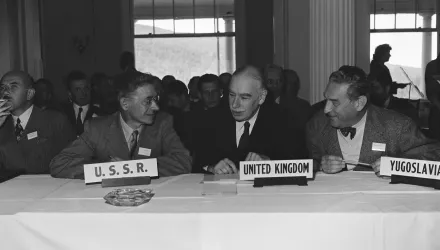International Security is America's leading peer-reviewed journal of security affairs.
This policy brief is based on "A U.S.-China Grand Bargain? The Hard Choice between Military Competition and Accommodation," which appears in the Spring 2015 issue of International Security.
Bottom Lines
- Understanding the Benefits of Territorial Accommodation. The 1938 Munich agreement gave accommodation a bad name. But under certain conditions, territorial concessions can help a state protect vital interests.
- Reevaluating the U.S. Commitment to Taiwan. Taiwan is the dispute most likely to draw the United States and China into a large war. In addition, the U.S. commitment to Taiwan feeds Chinese concerns about U.S. motives in the region and fuels competition over the sea lines of communication (SLOCs) in East Asia.
- Requiring Chinese Concessions. The United States should make accommodation on Taiwan contingent on Chinese concessions: China would peacefully resolve its disputes in the South China and East China Seas and officially accept the United States' long-term military presence in East Asia.
- Reassuring U.S. Allies. If the United States and China were to reach a grand bargain, the United States could take measures to reinforce its commitment to protect its East Asian allies.
Understanding the Benefits of Accomodation
Territorial accommodation is frequently viewed as a deeply flawed strategy, but it can be a state's best option for protecting vital interests. First, accommodation can satisfy or partially satisfy an adversary that wants to change the status quo, thereby reducing the costs the adversary is willing to pay to further change the status quo, which in turn reduces the probability of war. Second, accommodation can enhance an adversary's security by shrinking the military threat the state poses or by signaling the state's benign motives, or both—which in turns increases the state's own security. Third, accommodation can reduce military competition between the state and its adversary, which under a range of conditions can improve both states' security.
There are, however, costs and risks associated with territorial accommodation. First, the state loses the economic, security, political, and status value of possessing or defending the territory in question. Second, territorial accommodation could embolden the state's adversary, encouraging the adversary to pursue additional concessions. Whether this occurs depends on the adversary's motives—an adversary with limited aims could be satisfied with the initial round of concessions, whereas one with unlimited aims could be encouraged to expand further because it now doubts the state's resolve or because the concessions increased its power.
Third, concessions could lead allies to question the state's willingness to come to their defense in a crisis.
Reevaluating the U.S. Commitment to Taiwan
China's rise poses difficult challenges for the United States. If military competition and political frictions continue to intensify, the United States could find itself engaged in a new cold war. China has long made clear that unification with Taiwan is a paramount political and security goal. The United States is currently committed to defending Taiwan if China launches an unprovoked attack. This commitment is a deep source of Chinese distrust of, and tension with, the United States. Consequently, the United States should consider ending this commitment. Doing so would have both benefits and costs.
Benefits. Eliminating the U.S. commitment to Taiwan would have three main benefits. First, it would reduce the probability of war between the United States and China over Taiwan. China's improved military capabilities are reducing the United States' ability to come to Taiwan's aid in the event of a challenge from Beijing. These capabilities, combined with China's expectation of growing regional influence, may lead China to decide to seek reunification with Taiwan through military means. Second, U.S. support for Taiwan may be the most important policy-driven source of China's suspicions about U.S. motives and intentions in East Asia. Consequently, ending the U.S. commitment to Taiwan has the potential to dramatically improve U.S.-China relations. Third, terminating this commitment could also greatly moderate the intensifying military competition between the United States and China. Much of China's military modernization, including its growing capability to control the sea lines of communication (SLOCs) in the South China and East China Seas, is dedicated to defending Taiwan. The United States has devised a concept, widely known as AirSea Battle, to counter China's increasing capabilities and maintain dominance of these SLOCs. Ending the U.S. commitment to Taiwan would eliminate the scenario most likely to draw the United States into a large war with China, thus reducing the importance that China places on controlling these SLOCs and helping to significantly moderate U.S.-China competition.
Costs. Ending the U.S. commitment to Taiwan would put important U.S. political and ideological values at risk. Taiwan is a multiparty democracy with a population of 23 million. If China were to gain control of Taiwan, its authoritarian government would likely be unwilling to fully accept the political institutions and personal freedoms that Taiwan’s people currently enjoy. Additionally, U.S. accommodation on Taiwan could lead China to doubt U.S. resolve and embolden it to pursue more assertive policies in East Asia.
Requiring Chinese Concessions
To reduce the potential risk to Taiwan, the United States should make ending its commitment to Taiwan contingent of two Chinese concessions. First, China must resolve its disputes in the South China and East China Seas on fair terms. This could include placing the disputed territories, some of which have valuable gas and oil reserves, under international control. Such action would not only eliminate dangerous flash points, but also provide evidence of China's limited aims.
Second, China would officially accept the United States' long-term security role in East Asia, including its alliances and forward-deployed forces. This would reflect the Chinese leadership's willingness to incur the domestic political costs of confronting influential hard-liners who favor more ambitious Chinese policies in East Asia.
A grand bargain would not constitute the entirety of U.S. policy toward China. Unilateral measures and alliances would remain essential components of U.S. policy. When uncertain about a state's motives and goals, a state should pursue a mix of cooperative and competitive policies. In response to improvements in China's forces, the United States should invest in maintaining the military capabilities necessary to protect its allies, to preserve those allies' confidence in U.S. commitments, to deter crises and war, and to fight effectively if deterrence fails.
Reassuring U.S. Allies
Possibly the most frequently raised objection to the United States ending its commitment to Taiwan is that it would undermine the credibility of U.S. defense commitments to its East Asia allies. This concern is overstated. U.S. entry into a grand bargain with China would undoubtedly send political shockwaves throughout the Asia Pacific, but the United States could take a variety of actions to demonstrate the strength of its continuing commitments. For example, it could increase the capability of the forces it commits to the region and further deepen joint U.S.- Japan military planning and high-level discussions on the requirements for extended deterrence. In fact, the United States has already begun taking some of these measures.
U.S. alliances are likely to endure because its allies do not have options that are more appealing. Meanwhile, their need for security is likely to continue to grow as China rises. Any doubts about U.S. reliability are likely to convince them to work harder to strengthen their alliances with the United States, not to abandon it or to bandwagon with China.
Related Resources
Glaser, Charles L. Rational Theory of International Politics: The Logic of Competition and Cooperation (Princeton, N.J.: Princeton University Press, 2010).
Steinberg, James, and Michael E. O'Hanlon. Strategic Reassurance and Resolve: U.S.-China Relations in the Twenty-First Century (Princeton, N.J.: Princeton University Press, 2014).
Swaine, Michael D. "Beyond American Predominance in the Western Pacific: The Need for a Stable U.S.-China Balance of Power" (Washington, D.C.: Carnegie Endowment for International Peace, April 20, 2015), http://carnegieendowment. org/2015/04/20/beyond-american-predominance-inwestern- pacific-need-for-stable-u.s.-china-balanceof- power/i7gi.
Charles L Glaser is a professor in the Elliott School of International Affairs and the Department of Political Science at George Washington University.
International Security is America’s leading peer-reviewed journal of security affairs. It provides sophisticated analyses of contemporary, theoretical, and historical security issues.
International Security is edited at Harvard Kennedy School’s Belfer Center for Science and International Affairs and is published by The MIT Press.
For more information about this publication, please contact the International Security publications coordinator at 617-495-1914.
Statements and views expressed in this policy brief are solely those of the author and do not imply endorsement by Harvard University, the Harvard Kennedy School, or the Belfer Center for Science and International Affairs.
Glaser, Charles. “Time for a U.S.-China Grand Bargain.” July 2015





